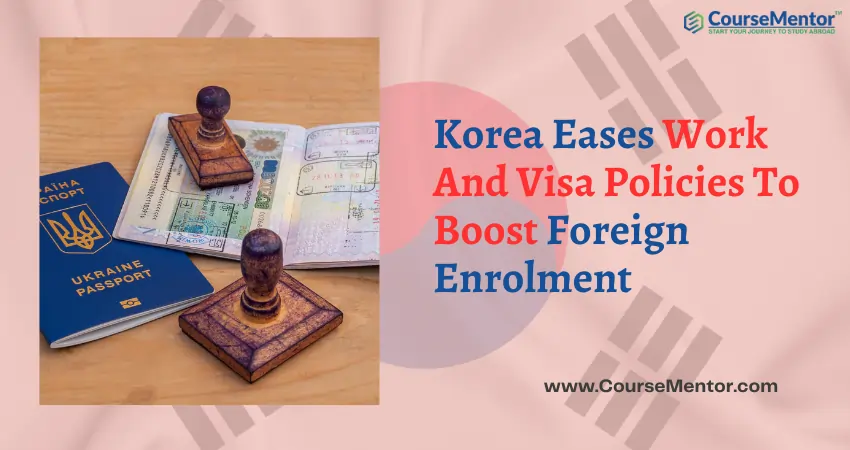Korea Eases Work And Visa Policies To Boost Foreign Enrolment: The education system of South Korea already feels the effect of an enrolment cliff from the US colleges. The country’s college population also has been falling for some time, and other essential drops are launched through the mid-point of this century.
Earlier this year, the (KCEU) Korean Council for University Education also projected the number of candidates qualified to join colleges or universities would decrease by almost 40% within the next 20 years, from approximately 460,000 as of 2020 to 280,000 by 2040. So, Korea Eases the Work Policies to boost foreign employment that we discussed in this article. So let us move on to our main topic.
Korea Eases Work And Visa Policies To Boost Foreign Enrolment
The South Korean Government said on 23rd June and introduced a new package of incentives created to attract thousands of students from around the globe. The Ministry of Justice said in a statement that we plan to improve the international student system, which would help increase the number of international students while enhancing international students ’ social adjustment.
This new package includes new visa regulations that began on 3 July 2023. Under these new regulations, students must show the minimum bank balance as a part of the D-2 visa applications, which will decrease from KRW26 million (US$20,000) to KRW20 million (US$15,000). Those students applying for D-4 visas for language studies will also show a minimum balance of KRW10 million (US$7,600) instead of the last requirement of KRW13 million (US$10,000).
The financial requirements for students are also dropped and even lower for those students who are applying for education outside of South Korean cities, where the new requirements for finance for D-2 are KRW16 million (US$12,000) and for D-4 visas are KRW8 million (US$6,000).
The South Korean Minister is also opening additional work opportunities for students during their studies, with the increased limit of working hours now being 25 hours per week from the previous limit of 20 hours. Those students registered from outside of the primary cities can now work up to 30 hours per week.
To be eligible to work during their studies in South Korea, students must prove they have sufficient knowledge of Korean language skills. Until now, students can demonstrate their skills through the Test of Proficiency in Korean. But now, the Ministry has extended the qualified tests to include the online Korean Language Ability Test and King Sejong Institute level test.
At last, the minister of the Korean Immigration Service also announced an easing of the rules for those who want to work and live in South Korea after graduation. The number of years in South Korea needed for an E-7-4 visa has decreased from 5 to 4 years, and hiring limitations on international employees have now also been eased for Korean employers.
So, it is all about Korea Eases Work And Visa Policies To Boost Foreign Enrolment.
For more information, keep visiting Course Mentor.
Source:- monitor.icef.com


